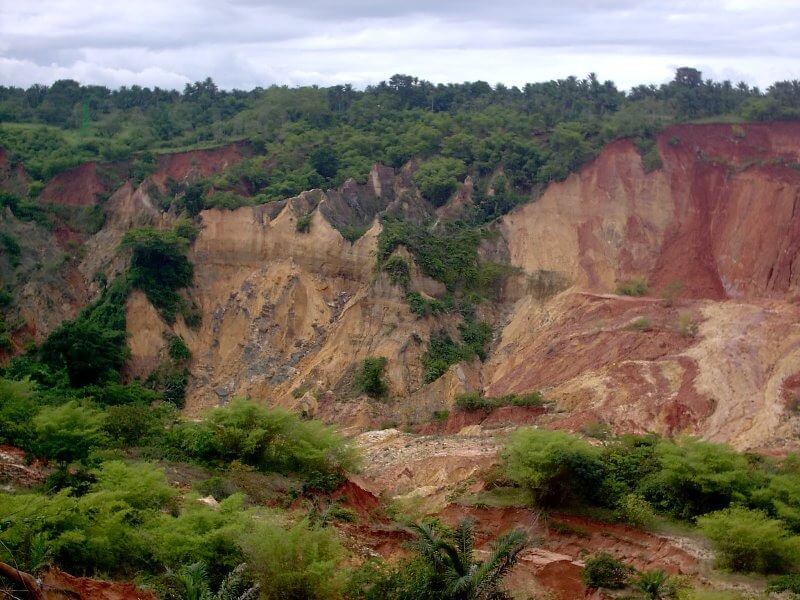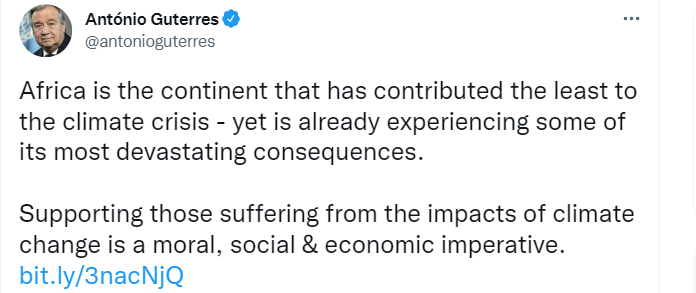Food Aid for Climate Change Adaptation in Africa (FACADA)
The Food Aid for Climate Change Adaptation in Africa (FACADA) is a component of PASDO’s Climate Change Adaptation (CADA) programme aimed at tackling the socio-economic impacts of climate change in Africa, particularly hunger and starvation.

These gully erosion and landslide activities are believed to be among the worst impacts of climate change in Africa.
INTRO
Excessive emission of greenhouse gasses as a result of previous and current activities of industrialized nations is increasing the temperature of the earth and causing global climate change.
Changing weather patterns, coupled with extreme weather events, is wrecking havoc on food security in Africa through various means.
Massive crop failures as a result of unpredictable weather for farming continue to occur.
Torrential rainfall and heavy floods destroy crops and farmers lose their investments.
Drought and desertification continue to reduce the area of arable land, leading to destruction of crops and clashes with farmers as herdsmen migrate to find green pasture.
Gully erosion and landslide activities wash off and bury both farmlands and crops in large scale.
All of these, and more, are leading to food scarcity and widespread hunger and starvation in a continent that has no hand in causing the climate crisis.
It is necessary that the world, particularly the industrialized nations, provide needed assistance to help Africans cope with these climate challenges.
In the words of the United Nations Secretary General, Antonio Guterres, “supporting those suffering from the impacts of climate change is a moral, social and economic imperative”.

Objective of The Food Aid for Climate Change Adaptation in Africa (FACADA) Programme
The objective of the Food Aid for Climate Change Adaptation in Africa (FACADA) is to provide food to the poor and hungry population in Africa being affected by the impacts of climate change.
Oxfam, SaveTheChildren and other humanitarian organizations estimate that one person dies of hunger every 48 seconds in Africa.
But, it doesn’t have to be so.
If we take action quickly (and steadily) enough, we would be able to save thousands of people from starvation.
How you Can Help
There are various ways that you can help out in the Food Aid for Climate Change Adaptation in Africa (FACADA) programme.
Below are a few of the ways:
Donate some meals
We kindly invite you to join the Food Aid for climate change adaptation in Africa (FACADA) programme and donate or sponsor one or more meals every set duration (say every week) to help the hungry in Africa. Or you could make a one time donation.
A pot of food (jellof rice) for a family of 5 costs about $20.5 to prepare. That is about $4.1 per person. But some meals go for about $3 per individual.
It is up to you to decide how many meals you wish to sponsor.
3 USD can provide a meal,
12 USD can provide 4 meals,
30 USD can take care of 10 meals,
60 USD can take care of 20 meals,
120 USD can take care of 40 meals, and
1,200 USD can take care of 400 meals.
You could term this as your personal “Official Development Assistance (ODA)”, or PrivODA.
ODA (Official Development Assistance) is a term used in international development and diplomacy to describe a mechanism used by OECD countries to voluntarily donate a percentage of their national income towards helping developing countries.
To donate, please use our donation form.
Become an Online Volunteer
You can become an online volunteer under PASDO and handle some tasks related to FACADA or our general climate change adaptation programme.
Kindly visit the volunteer section of our website to find available volunteer opportunities.